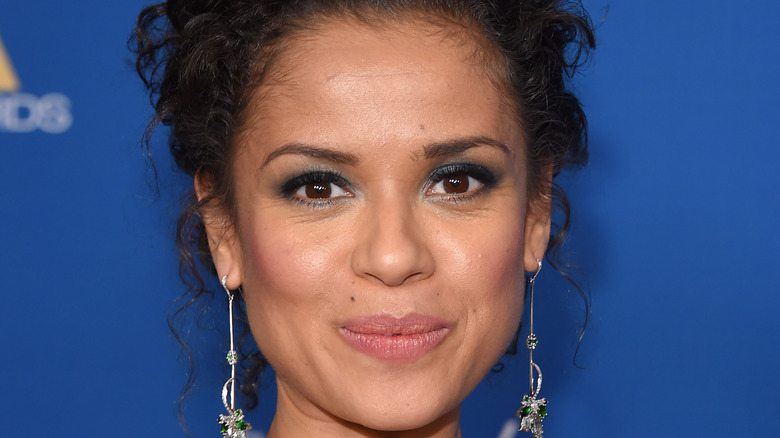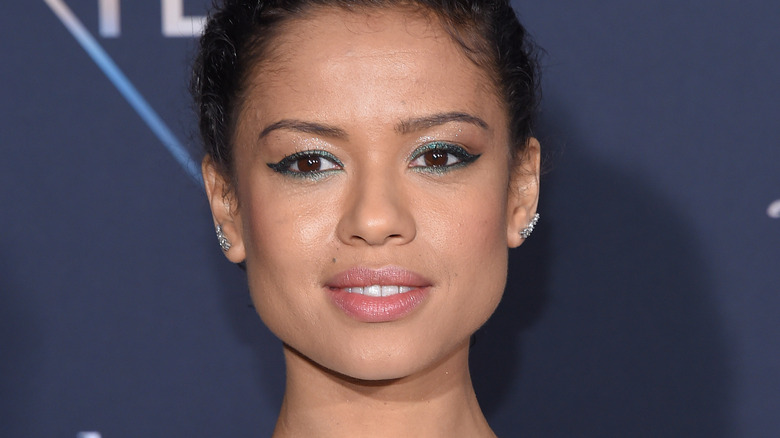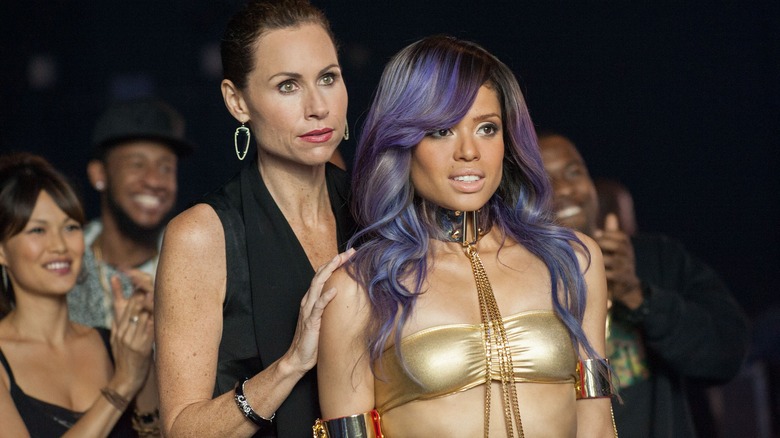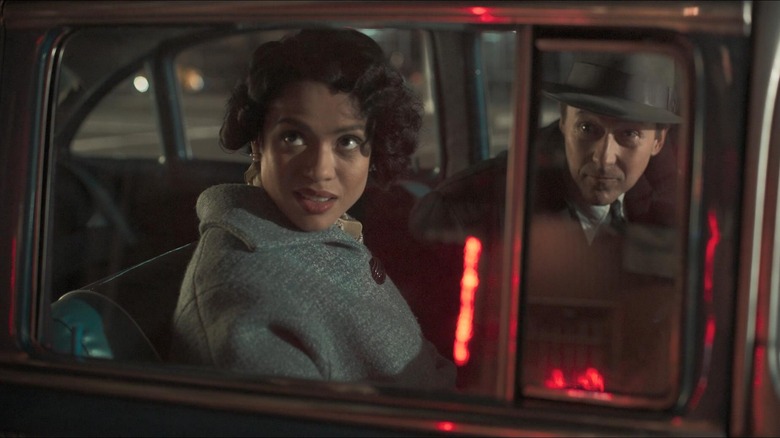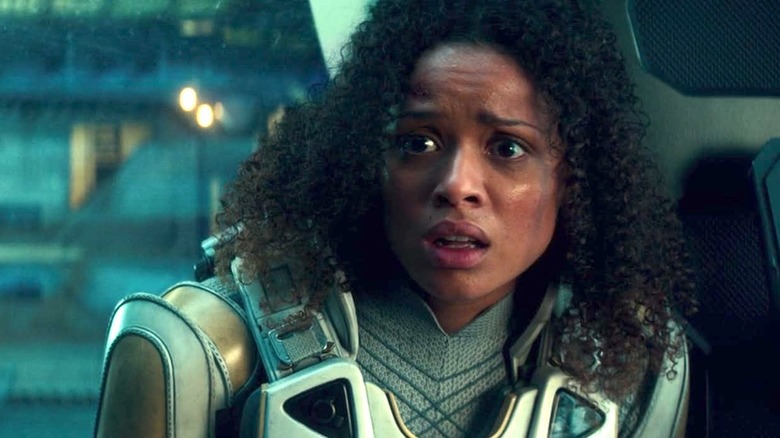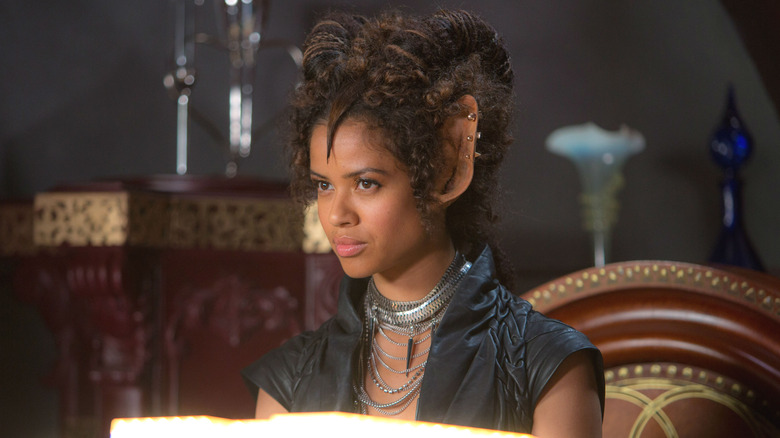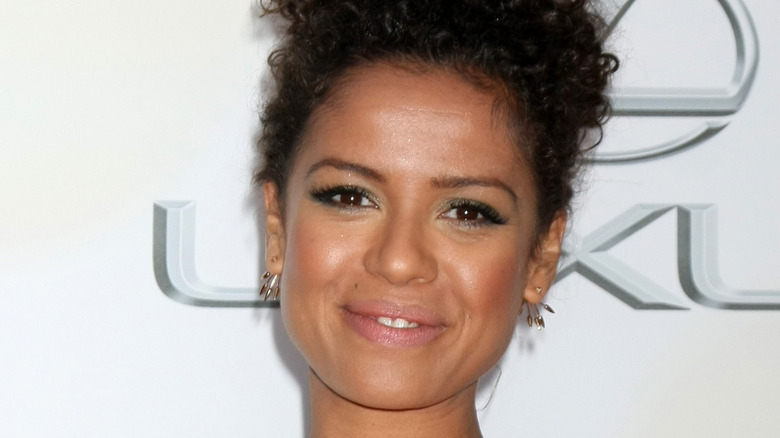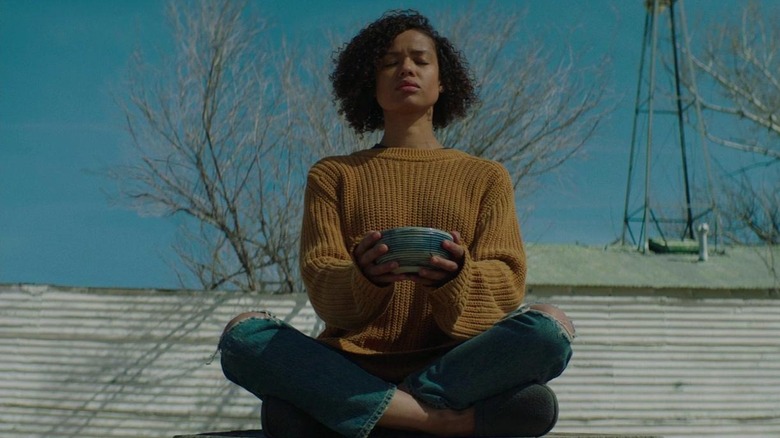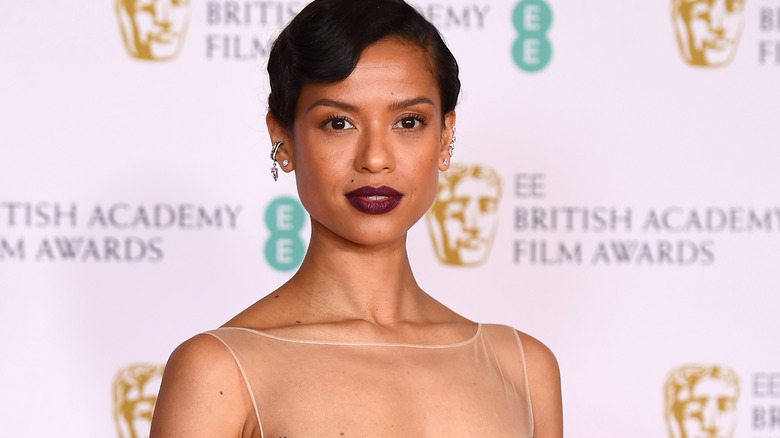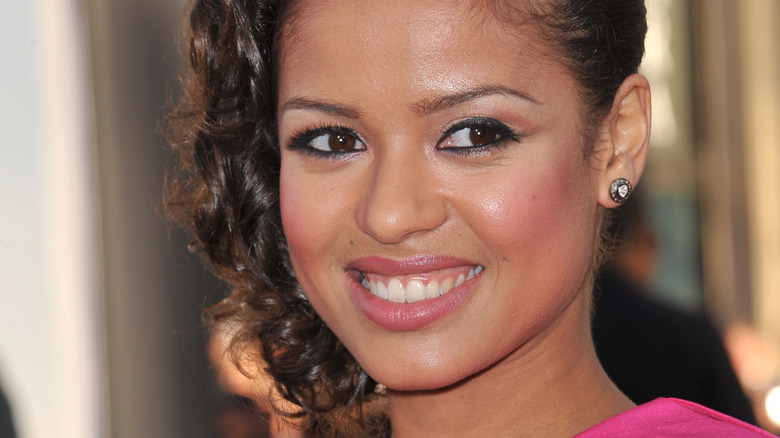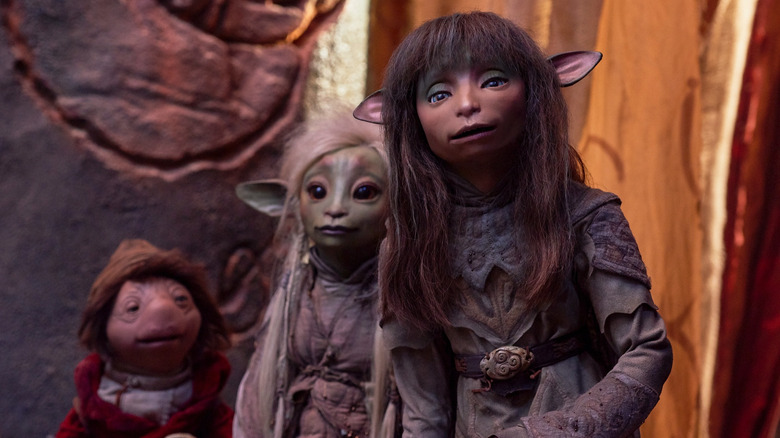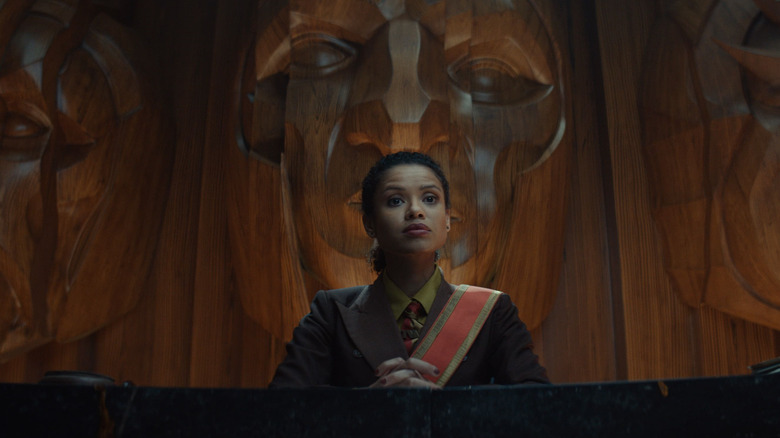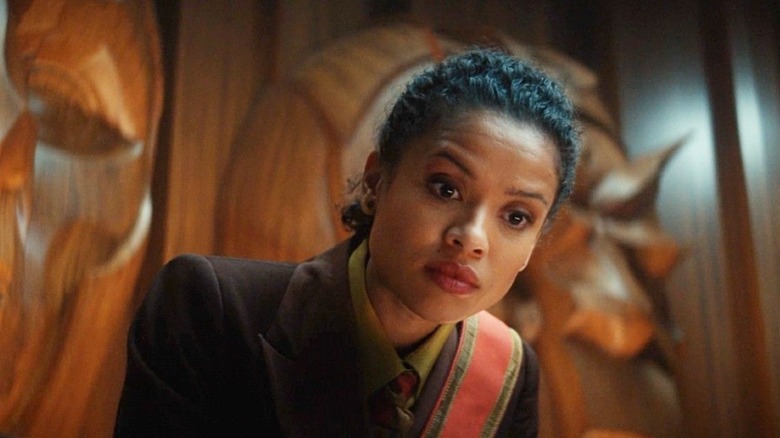The Untold Truth Of Gugu Mbatha-Raw
Though her first major American movie acting credit only came relatively recently with the 2011 feature "Larry Crowne," Gugu Mbatha-Raw has lately become a well-known figure in pop culture, largely thanks to her memorable performance as Judge Ravonna Renslayer in the Marvel Cinematic Universe TV series "Loki." Long before that, however, she was earning accolades and praise for her work in independent features like "Belle," "Beyond the Lights," and "Fast Color." This eclectic collection of movies demonstrated that Mbatha-Raw could portray a wide variety of characters in an equally diverse array of genres, while maintaining a consistent level of quality in her acting. Simply put, Gugu Mbatha-Raw has become an exceptional performer that's on everybody's radar.
With her star soaring more than ever, now is a prime time to explore the untold truth of Gugu Mbatha-Raw, from how she first got into the acting game to her experiences headlining a quickly canceled J.J. Abrams TV show in 2010 to how she was pitched "Loki." Gugu Mbatha-Raw may not have decades of acting credits under her belt like many performers, but her untold truth indicates what a fascinating artist she's already become in her career.
How she caught the acting bug
Like so many actors, Gugu Mbatha-Raw has been enamored with this craft from a young age. Acting is a challenging profession in which to make a living and you need a lifelong passion kindled during childhood to help get you through all the obstacles along the way. Unlike so many other performers, though, Mbatha-Raw got entranced with acting specifically through the art form of ballet.
"I have always enjoyed performing ever since I can remember. My mother first took me to a ballet class at age 4 and I loved it so much I begged her to let me take tap classes and then modern dance and by the time I was 6 or 7 I was dancing most evenings!" Mbatha-Raw recounted to Crash Cinema. "Then I joined a local youth drama group and was in all my school plays ... My first stage role was Dorothy in the 'Wizard Of Oz' at 11!" Mbatha-Raw's journey next took her to London's Guildhall School of Music and Drama, where her grade exams in drama led her to apply to the National Youth Music Theatre and the National Youth Theatre. "I can't think of a time when I didn't want to be performing," she added. "But my route to acting definitely came first through my love of ballet."
She had help with her performance in Beyond the Lights
The acclaimed 2014 feature "Beyond the Lights" sees Gugu Mbatha-Raw playing pop star Noni Jean, who's torn between her obligations as an artist and her personal desires as a person. To tackle that kind of multifaceted role, Mbatha-Raw couldn't just rely on herself. She's been open about the help she received from other members of the "Beyond the Lights" crew in making sure she could deliver an authentic performance fitting for such a fascinatingly complicated individual.
"I worked with an amazing vocal coach called Debra Byrd and also the music producer who wrote all of Noni's songs is The Dream, who wrote 'Umbrella' for Rihanna and 'Single Ladies' for Beyoncé," Mbatha-Raw explained to Desde Hollywood. "Also, Laurieann Gibson did all the choreography and I spent hours sweating it out in the dance studio with her. So, with the combination of working with people that really are at the top of their game in the contemporary music industry, I was feeding off them and being guided by them and that really helped." No artist truly works alone and Mbatha-Raw's collaborators on "Beyond the Lights" are a great example of that truth.
How she scored a role in Motherless Brooklyn
Given how many different genres she's appeared in over the course of her career, it shouldn't be a surprise that Gugu Mbatha-Raw managed to score a pivotal role as Laura Rose in director and star Edward Norton's 2019 neo-noir, "Motherless Brooklyn." Long before she delivered her impressive on-screen work in the film, Mbatha-Raw was just an actor in contention for the part, which she expressed enthusiasm for from the start.
"My agent sent me the script, and I was like, 'Wow, Edward Norton. I'm such a huge fan of his work, and I have been for such a long time,'" Mbatha-Raw explained to Comics Beat. "I read the script and just thought it was so rich and layered. I loved the noir genre, so I met with Edward. I was in New York for something else, and I met with him in the West Village for a cup of tea ... We just talked about the film. I hadn't read the book, and he sort of joked, 'Well, don't read the book. You probably won't take the role, because the character's not in the book.'" After this exchange, Mbatha-Raw noted, "I know that he went away and watched a lot of my work, and then I was offered the part a couple weeks later." With that, Gugu Mbatha-Raw got added to the starry cast of "Motherless Brooklyn."
How she reacted to The Cloverfield Paradox going straight to Netflix
The third "Cloverfield" movie, "The Cloverfield Paradox," had an ensemble cast full of notable names, and headlining that collection of talent was Gugu Mbatha-Raw. Despite being loosely connected to a famous franchise, "The Cloverfield Paradox" had its theatrical release date constantly delayed and ended up getting shuttled over to Netflix. The sudden nature of that streaming launch was a shock to both the general public and cast members like Mbatha-Raw.
"I found out the same as the rest of the cast on the morning of the Super Bowl," Mbatha-Raw recalled to SlashFilm. "We all had a conference call at 11am that morning, and I had no idea. I had no idea. I knew it was Super Bowl Sunday, and I thought maybe the news would be that there would be a trailer (laughs). That was literally as far as my imagination had stretched. So yeah, it was a surprise. It was a complete surprise, and a shock. It's a new way to debut a movie. It took me a long while to process that."
The British actress added, "It's interesting, it's sort of an experiment in a way. As an actor, you have control over few things, so sometimes you just have to be zen about that stuff (laughs). Otherwise, as I say, you can't get caught up in controlling those kind of moments. But it was a privilege to have that sort of debut, I suppose."
She wore prosthetics for the first time in Jupiter Ascending
After years of appearing in independent films, Mbatha-Raw landed a supporting role in the sci-fi spectacle "Jupiter Ascending." A massively expensive project from the Wachowski siblings, "Jupiter Ascending" featured Mbatha-Raw as Famulus, a half-human/half-deer alien. The part wouldn't just call for Mbatha-Raw to interact with green screen and CG elements for the first time, it would also involve her inaugural foray into the world of acting with prosthetics.
"For the film I had the new challenge of wearing prosthetics for the first time," Mbatha-Raw explained to Crash Cinema. "Although I'm very recognizably me, the final character has prosthetic ears and an elaborate hornlike headdress! It was very interesting to see how the Wachowskis created this vibrant world and I have a lot of respect for the talent of the makeup, costume and production design teams — it was a very visually stimulating set to be on!" Leave it to the filmmakers behind "The Matrix" and "Speed Racer" to offer actors like Mbatha-Raw a chance to explore new, visually challenging domains as performers.
She feels an 'element of responsibility' with her performances
Actors already have a lot of responsibility on their shoulders. For many performers acting in mainstream fare, there's the extra layer of making sure they're using their prominent platform to aid the betterment of the world rather than adding more toxicity into the planet. This concept was very much on the mind of Gugu Mbatha-Raw in November 2014 when she was asked by Desde Hollywood if she would continue to pursue roles that qualify as "aspirational" in the future.
"It is important to be conscious of the message that you're putting out there," Mbatha-Raw responded. "We do have a platform as artists and making these films is such a collaborative experience. It takes a lot of blood, sweat and tears to get a movie to the screen. I do feel a certain element of responsibility to say something worth saying with it, as well as entertainment."
As for what was "worth saying" in a film like "Beyond the Lights," Mbatha-Raw found that the movie's romance was "a universal love story, but I think it's a story of female empowerment and finding your authentic self. That's something that we need to celebrate more in our culture." All that responsibility that comes with an actor can be daunting, but through pinpointing positive elements of her movies, Mbatha-Raw clearly looks at that byproduct as an opportunity for good rather than a hindrance.
How she viewed Fast Color as different from typical superhero movies
In 2019, "Fast Color" hit theaters after its March 2018 debut at the South by Southwest Film Festival. This intimate drama centered on Mbatha-Raw as a superpowered being navigating her complicated relationships with her mother (Lorraine Toussaint) as well as her daughter (Saniyya Sidney).The acclaimed feature drew much of its praise for deviating from the spectacle-driven norms of superhero storytelling in cinema. According to Mbatha-Raw, this was very much a conscious choice.
"This is certainly not a superhero movie in the Marvel or DC sense," Mbatha-Raw said to SlashFilm. "That's pretty clear, but what's so refreshing about it is exactly that. Our culture has perhaps reaching a saturation point with a certain type of superhero movie. But with films like 'Black Panther,' 'Wonder Woman,' 'Captain Marvel,' we're seeing more females at the helm, but there are hardly any female superheroes of color, certainly not three generations of them ... it takes the layers of what it means to be a woman and doesn't simplify any of that."
Mbatha-Raw continued to say that she responded to the "authenticity" of the world in which "Fast Color" was set, adding, "It's a recognizable world — no one is wearing a cape or a suit. You don't need a weapon. Ruth has one altercation with a gun, but just for self defense ... It's not a destructive power she has; it's ultimately a creative power. That I found really original."
What it was like on her TV show Undercovers
Today, the 2010 NBC TV show "Undercovers" is a mostly forgotten pop culture relic, mostly known as evidence that even J.J. Abrams (the creator of the series) can't knock everything out of the park 100% of the time. But one notable element of the short-lived "Undercovers" is that it starred Mbatha-Raw in her first significant role in the American entertainment industry. Though the show never got past 11 episodes, this milestone means the show still holds a special place in Mbatha-Raw's heart.
"It was a bit of a blur because it was really a baptism-by-fire for me," Mbatha-Raw told The A.V. Club about "Undercovers." "Doing network television in L.A. was just such a culture shift for me. And with J.J. Abrams directing the pilot, producing the show — with the ambitions and the scope of the show — every episode we were in a different country, even though we didn't leave L.A., you know? [Laughs.] There was action, and different accents, and — yeah, huge fond memories, actually. I'm so glad to have done it, and it really did set me up for everything else to come." Mbatha-Raw's comment about "Undercovers" setting up "everything else to come" is quite accurate, given how it established her affinity for genre fare as well as a connection to Abrams that would resurface with "The Cloverfield Paradox."
Why she so regularly works with women filmmakers
Throughout her career, Mbatha-Raw has regularly worked with talented directors who also happen to be women. This doesn't just include independent features like Amma Assante's "Belle" or Gina Prince-Bythewood's "Beyond the Lights." When it comes to bigger-budgeted fare, Mbatha-Raw has worked with the Wachowski sisters on "Jupiter Ascending," while her first foray into the Marvel Cinematic Universe, "Loki," was directed by Kate Herron. Apparently, Mbatha-Raw doesn't specifically strive for this but she's still grateful for the way it's turned out.
"I'm a woman, so I look for the best challenge," Mbatha-Raw explained to SlashFilm. "I look for somebody who has written the most nuanced character for me to play. I'm always looking to stretch, and it's not always the case, but for me, it is women who have written the most nuanced stories with someone like me at the center. That's usually where I've found I can get my teeth into. So that's what I'm looking for, but that's not to say that I'm discounting male directors. I'm looking for the best material and the best acting challenge, and the message is key — What is this movie saying? What is the conversation about?" Keeping those qualities in mind has led Mbatha-Raw to work with some of the more acclaimed and bold filmmakers of the modern era.
Doing voicework for The Dark Crystal: Age of Resistance was a joy
The Netflix series "The Dark Crystal: Age of Resistance" had no shortage of famous names in its voice cast. Alongside the likes of Jason Isaacs and Taron Edgerton was Gugu Mbatha-Raw portraying the character Seladon. A figure who constantly toes the line between being an ally to her sister and a self-serving aid to the nefarious Skeksis, the character's fascinating nature was enhanced by Mbatha-Raw's fully committed vocal performance. Tackling the task of voicing a Gelfling struck a personal chord with this performer.
"It was such a special thing for me to work on a Jim Henson show," Mbatha-Raw enthused to The A.V. Club. "Growing up with things like 'Fraggle Rock' and 'Jim Henson's The Storyteller,' and obviously 'The Muppets' — there's just so much — that to be able to voice one of those puppets was kind of my childhood dream! So I'm happy to have done it." Preparations for the show were also apparently memorable, as Mbatha-Raw said, "They sent me this massive bible of 'The Dark Crystal' in the mail that just had everything on the original, and all the imagery, and everything to sink my teeth into." With so much material to inform her vocal performance, no wonder Gugu Mbatha-Raw was able to deliver standout voicework in the star-studded "Age of Resistance."
How the Loki character Judge Renslayer was pitched to her
Certain characters in the Marvel Cinematic Universe are iconic figures that were household names long before they showed up in this multimedia franchise. But others, like Gugu Mbatha-Raw's "Loki" character Judge Ravonna Renslayer, are more obscure figures to even diehard comics fans. Therefore, it's no surprise to learn that what attracted to Mbatha-Raw to playing Renslayer wasn't the fame inherent in that fictional character, but rather the way this show would be exploring this iteration of Renslayer.
"It was very much sold to me as a darker, deep dive into this antihero — everybody's favorite villain, really, Loki," Mbatha-Raw recalled to ScreenRant. "And for me, my character — a judge in the TVA, the Time Variance Authority — was very much pitched to me as this authoritative character who's kind of a boss and runs this area of the TVA. She's powerful and strong and has a lot of authority over Loki. So I thought that could be quite fun." Mbatha-Raw also noted that the unique dynamic between her character and Owen Wilson's Mobius, which gets more and more complicated as "Loki" progresses, further helped to make the lesser-known Renslayer somebody she wanted to inhabit in the MCU.
How she processed the scope of Loki
There's a lot going on in "Loki": all the time travel shenanigans, the concluding creation of the multiverse, the way it connects to other Marvel Cinematic Universe properties. It's a lot to process when you're watching it unfold, let alone when you're one of artists tasked with bringing this show to life. This was just as true for Gugu Mbatha-Raw as anyone, with the actress requiring some visual stimuli to fully process what this wonky TV program was going for.
"Initially, it was quite a lot to get your head around," Mbatha-Raw told ScreenRant. "I had a great conversation with Kate Herron, our director, and she was explaining everything about the Time Keepers and the Sacred Timeline and the Time Variance Authority. And it was sort of mind-blowing, because it's all world-building of an aspect of the MCU that we haven't even really seen on screen before. It was a lot to get my head around. But then once I read the scripts, and I saw the sets and we got into doing some rehearsals and some stunt training and everything, it all started to fit together." Thanks to the process of turning script pages into something more tangible, Gugu Mbatha-Raw was able to process the daunting world of "Loki."
